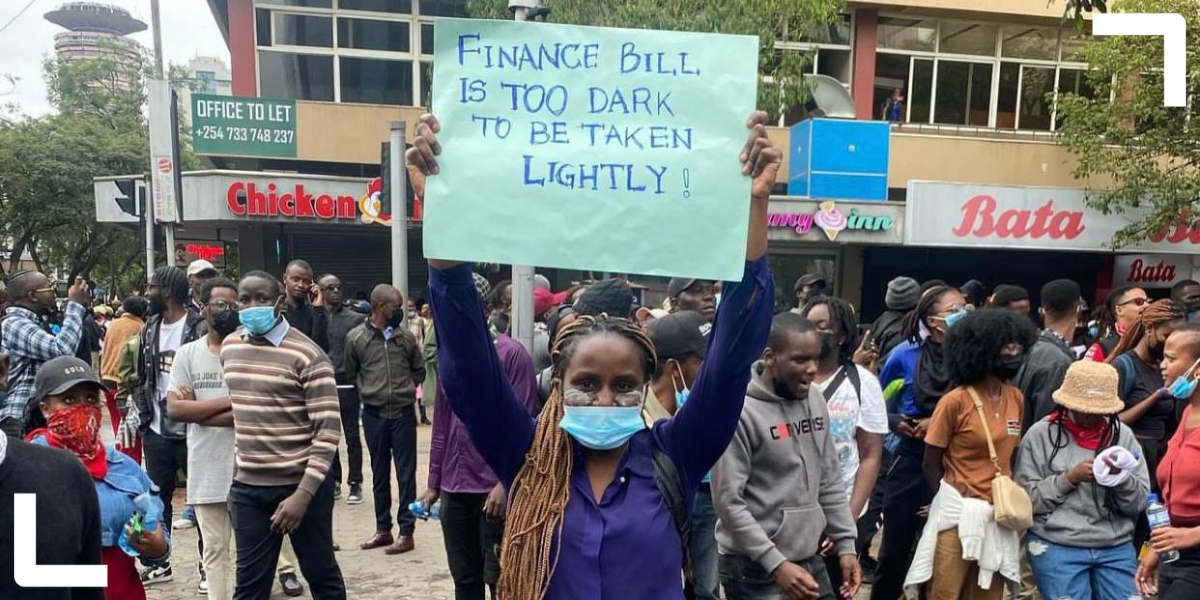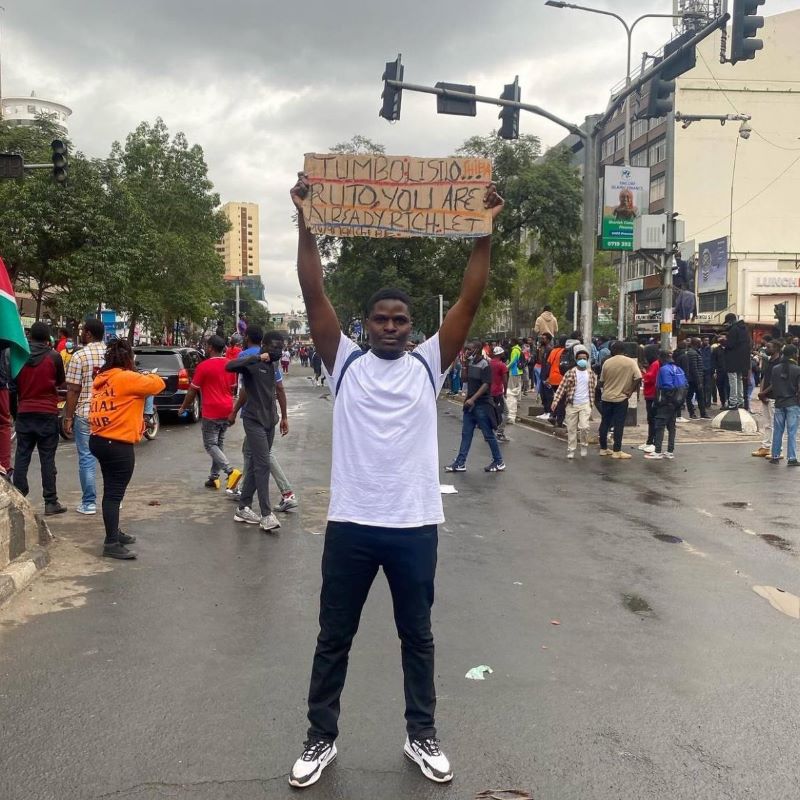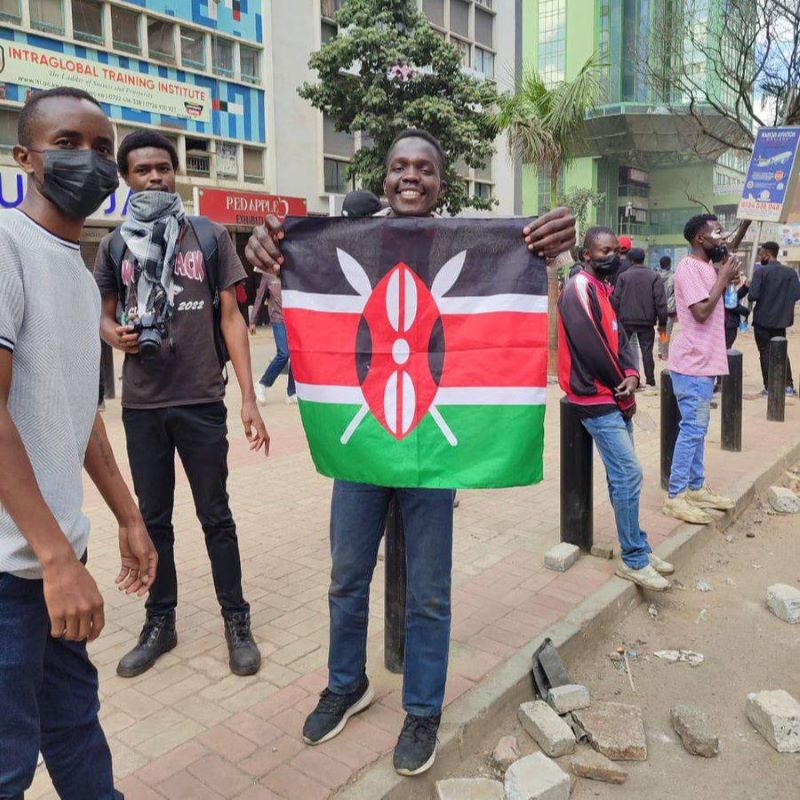By Rosebella Apollo, Jerry Okal and Jack Makau
Kenya has recently witnessed a unique series of protests, distinct from typical political demonstrations. These protests, known locally as “Maandamano”, have transcended regional, political, ethnic, social, and economic boundaries in Kenya. They reflect a growing concern among Kenyans about the high cost of living, persistent governance issues, corruption, foreign debt and an increasing inflation rate.
The country’s escalating debt and its impact on service delivery and the economy have been a major worry. Despite various unsustainable measures and coping strategies, Kenyans have quietly continued to bear the burden of unpopular political decisions. The ruling class and elites have taken advantage of this silence to push through unpopular legislation and rulings, making the economic situation even more dire.
Rising above the repression
A few months ago, the reality of Kenyans rising against punitive economic challenges seemed farfetched – let alone the idea of young people being able to meaningfully organise and participate in political processes. However, the contested Finance Bill of 2024 triggered unforeseen countrywide demonstrations to protest the finance bill, a punitive piece of legislation which sought to raise revenue of KES 3.7 trillion through taxation and acquisition of additional public debt.
Unlike the long history of the political elite-led demonstrations, the nationwide protests were led and headed predominantly by young people, known as Generation Z (Gen-Z) – those born in the late 90s and early 2000s – who demanded rejection of the finance bill. Over time, these demands evolved to decry the state of corruption, escalating public debt, accountability, impunity, incompetence, cronyism and wastage of public resources in both the executive and legislative arms of government.
Technology as a positive disruptor and an organising tool
The recent Gen-Z protests in Kenya have led to various outcomes and repercussions, including the rejection of the 2024 Finance Bill, changes in the cabinet secretaries, dissolution of 47 cooperatives, suspension of re-appointments in the civil service, and the abolishment of unconstitutional offices.
But what are the implications of these events for Kenya and the African continent as a whole?
A young man holds a placard at a protest in Nairobi
Firstly, the youth have challenged the established political order and tested the traditional political settlement theories that suggest power is primarily held by political elites. These events in Kenya could potentially lead to a shift in political power and the onset of a “co-shared political power” era of governance and public scrutiny on the affairs of the state.
Secondly, Gen-Z has redefined the organisation and conduct of protests. By using technology, especially social media to coordinate and validate their concerns, garner support from allies – including millennials and civil society – as well as communicate and orchestrate peaceful nationwide protests, they have reshaped the negative perception often associated with protests involving violence and destruction.
A sense of deepened accountability
The elite have long taken advantage of young people to further their own agendas. In the past, politicians used the youth majorly to win elections and cause disruptions for their own selfish gains. However, the recent Gen-Z protests signal a shift. Young people are no longer apathetic to political processes – they are politically aware and are willing to self-organise and rally support for issues that directly impact their future.
As seen in these ongoing protests, Gen-Z consistently raises valid concerns, supported by evidence, and proposes solutions. This pressure from the younger generation is pushing the government to increase transparency, accountability and improve service delivery.
Beyond the youth, we can expect to see other interest groups – such as registered professional bodies, university student organisations, organised civil society and human rights groups – rising to boldly and decisively challenge the status quo demand change. These actions are helping to open up the civic space, giving people a voice and agency.
Challenging dominant power configurations
The traditional political base in Kenya has been largely organised along tribal lines, with tribal alliances playing a key role in forming the ruling leader’s block. However, recent events, including the Gen-Z protests, suggest a shift towards issue-based politics that transcends ethnicity and emphasises the push for change.
The Gen-Z protesters have presented themselves as tribeless, leaderless and partyless, making it challenging for the ruling class to engage with and quell the protests. In response to relentless pursuits from peaceful Gen-Z protestors, the Kenyan police force resorted to using excessive force, brutal crackdowns, abductions and detentions, leading to at least 50 fatalities.
In the face of threats and deaths, the young people have been resilient and focused on their demands for greater accountability by the government. If this trend continues, it may lead to significant changes in power dynamics, challenging the dominance of tribal kingpins and other leadership figures. It is also becoming increasingly apparent that power ultimately belongs to the people, highlighting the need for political and ruling elites to strike a balance between serving the electorate’s aspirations and pursuing their own interests.
Youth participation in political and change processes
If the large numbers of youthful protestors across major towns in Kenya are anything to go by, Kenyan youth have rightfully earned their place in charting their destiny. The profound realisation that there is “nothing for us without us” will drive the youth to exercise agency in defining what matters to them.
Going forward, we anticipate that the youths will meaningfully participate in crucial processes and expect them to propose uncomfortable radical decisions that safeguard their interests. Subsequently, the success of any leadership block will depend on their ability to address concerns of dissenting youthful voices and co-produce solutions with their future in mind.
A young man holds a Kenyan flag at a protest in Nairobi
Leading the way for other African youth to challenge the status quo
Since the historic protests began in mid-June, 2024 the rest of the continent has been closely following the Gen-Z protests. The challenges that triggered Kenya’s wave of protests are experienced in other African nations, and youthful voices are being heard across the continent – through movements such as #EndBadGovernance and End SARS in Nigeria, protests against corruption and human rights abuses in Uganda, and #FeesMustFall in South Africa, among others.
Plans for protests are slowly percolating in different forms and shapes. Inspired by the recent protests in Kenya, which led to President William Ruto declining to sign the Finance Bill 2024 and implementing significant government reforms, Nigerian youths took to social media to call for change in their own country. A series of protests by the Gen Z youths in August, 2024 to demanded better governance from the ruling administration.
Beyond Africa, there were recent protests in Bangladesh led by young university students. The protesters were opposing the reinstatement of a quota that reserves 30% of government jobs for children of independence war veterans, which they argue favours supporters of the ruling party. The protests were intense and eventually led to the Prime Minister fleeing the country.
Given the prevailing circumstances of each country’s civic space, it is likely that more youth will attempt to use demonstrations as a way of igniting political activism – expressing their dissatisfaction and raising their voices to address critical issues that negatively impact their lives.
In Africa, young people in their numbers are an invaluable strategic resource. As rapid urbanisation and youth bulge continue to proliferate the African continent, there is a need to find more practical ways of including traditionally marginalised youth in co-creating urban transformation initiatives, to provide opportunities and harness the benefits associated with a youthful demographic.
Photo credits: Sarah Ouma / SDI-Kenya. The header photo shows a young woman holding a placard at a protest in Nairobi.
Note: This article presents the views of the authors featured and does not necessarily represent the views of the African Cities Research Consortium as a whole.
The African Cities blog is licensed under Creative Commons Attribution-NonCommercial-NoDerivatives 4.0 International (CC BY-NC-ND 4.0), which means you are welcome to repost this content as long as you provide full credit and a link to this original post.




